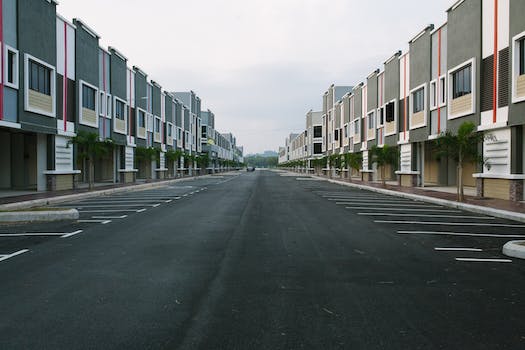How To Start A Business Flipping Houses
“Transforming rundown properties into profitable investments – A beginner’s guide to house flipping.”
Introduction
Flipping houses is a popular way to start a business in the real estate industry. It involves buying a property, renovating it, and then selling it for a profit. This can be a lucrative business if done correctly, but it also requires a lot of hard work and knowledge about the real estate market. In this article, we will discuss the steps you need to take to start a business flipping houses.
Finding the Right Property: Tips and Tricks
Are you interested in starting a business flipping houses? If so, one of the most important steps is finding the right property. Here are some tips and tricks to help you get started.
First, it’s important to do your research. Look for properties in areas that are up-and-coming or have a high demand for housing. You can use online resources such as Zillow or Redfin to search for properties in your desired location. Additionally, consider working with a real estate agent who specializes in investment properties. They can provide valuable insight into the local market and help you find properties that meet your criteria.
Once you’ve identified potential properties, it’s important to evaluate them thoroughly. This includes conducting a thorough inspection of the property to identify any potential issues or repairs that may be needed. You should also research the property’s history, including any past sales or liens. This information can help you determine the property’s true value and potential for profit.
When evaluating a property, it’s also important to consider the cost of renovations. Look for properties that require cosmetic updates rather than major structural repairs. This will help keep your renovation costs low and increase your potential profit margin.
Another important factor to consider when finding the right property is the financing. Flipping houses can be a costly endeavor, so it’s important to have a solid financing plan in place. Consider working with a lender who specializes in investment properties or exploring alternative financing options such as hard money loans.
In addition to these tips, it’s important to have a clear understanding of your target market. Who are you flipping the property for? Are you targeting first-time homebuyers or investors? Understanding your target market can help you make informed decisions about the property’s location, size, and features.
Finally, don’t be afraid to think outside the box when it comes to finding the right property. Consider attending local auctions or exploring off-market properties. These options may require more legwork, but they can also provide unique opportunities for profit.
In conclusion, finding the right property is a crucial step in starting a business flipping houses. By doing your research, evaluating properties thoroughly, considering renovation costs and financing, understanding your target market, and exploring alternative options, you can increase your chances of success. Good luck on your flipping journey!
Creating a Budget and Sticking to It

Starting a business flipping houses can be a lucrative venture, but it requires careful planning and budgeting. In this article, we will discuss how to create a budget and stick to it when flipping houses.
The first step in creating a budget is to determine your overall financial goals. Are you looking to make a quick profit or build a long-term business? Once you have a clear understanding of your goals, you can begin to create a budget that aligns with them.
The next step is to determine your initial investment. This includes the purchase price of the property, any repairs or renovations that need to be made, and any other expenses associated with the purchase. It is important to be realistic about these costs and to factor in unexpected expenses that may arise.
Once you have determined your initial investment, you can begin to create a budget for ongoing expenses. This includes things like utilities, property taxes, insurance, and maintenance costs. It is important to be thorough when creating this budget and to factor in any potential expenses that may arise.
One of the most important aspects of sticking to a budget when flipping houses is to be disciplined with your spending. It can be tempting to overspend on renovations or to make unnecessary purchases, but this can quickly eat into your profits. It is important to stay focused on your budget and to only spend money on things that are necessary for the success of the project.
Another key to sticking to a budget is to be flexible. Unexpected expenses will inevitably arise, and it is important to have a contingency plan in place. This may mean cutting back on other expenses or finding creative ways to save money on the project.
One way to save money when flipping houses is to do some of the work yourself. This may include painting, landscaping, or minor repairs. However, it is important to be realistic about your skills and to know when it is best to hire a professional. Making mistakes can be costly and can eat into your profits.
Finally, it is important to track your expenses and to adjust your budget as needed. This may mean cutting back on certain expenses or finding ways to save money on future projects. By staying on top of your finances and being disciplined with your spending, you can ensure the success of your business flipping houses.
In conclusion, starting a business flipping houses can be a lucrative venture, but it requires careful planning and budgeting. By creating a budget and sticking to it, you can ensure the success of your project and maximize your profits. Remember to be disciplined with your spending, be flexible, and track your expenses to adjust your budget as needed. With these tips in mind, you can start your journey towards a successful business flipping houses.
Renovating for Profit: What to Focus On
Flipping houses can be a lucrative business if done correctly. However, it can also be a risky venture if you don’t know what you’re doing. One of the most important aspects of flipping houses is renovating the property to increase its value. In this article, we’ll discuss what to focus on when renovating a property for profit.
First and foremost, it’s important to have a clear understanding of your target market. Who are you renovating the property for? Is it a family home or a rental property? Knowing your target market will help you make informed decisions about what renovations to make.
One of the most important areas to focus on when renovating a property is the kitchen. The kitchen is often the heart of the home and can make or break a sale. A modern, functional kitchen with updated appliances and plenty of storage space can add significant value to a property. However, it’s important to strike a balance between functionality and cost. You don’t want to overspend on a kitchen renovation and eat into your profits.
Another area to focus on is the bathroom. A clean, modern bathroom with updated fixtures and plenty of storage space can also add significant value to a property. However, like the kitchen, it’s important to strike a balance between functionality and cost. You don’t want to overspend on a bathroom renovation and eat into your profits.
In addition to the kitchen and bathroom, it’s important to focus on the overall layout of the property. Open floor plans are popular with buyers and can make a property feel more spacious. If possible, consider knocking down walls to create a more open layout. However, it’s important to consult with a structural engineer before making any major changes to the property.
Another area to focus on is the curb appeal of the property. The exterior of the property is the first thing potential buyers will see, so it’s important to make a good first impression. This can be achieved through landscaping, painting the exterior, and updating the front door and windows.
When renovating a property, it’s important to keep in mind the overall budget. It’s easy to get carried away with renovations and overspend, but this can eat into your profits. Set a budget for each renovation and stick to it. It’s also important to keep track of all expenses and receipts for tax purposes.
In conclusion, renovating a property for profit requires careful planning and consideration. Focus on the kitchen, bathroom, overall layout, and curb appeal of the property. Keep in mind your target market and set a budget for each renovation. With the right approach, flipping houses can be a profitable business venture.
Marketing Your Flipped Property: Strategies for Success
If you’re looking to start a business flipping houses, one of the most important aspects of your success will be your ability to market your flipped properties effectively. After all, you can have the most beautifully renovated home in the world, but if no one knows about it, you won’t be able to sell it for a profit. In this article, we’ll explore some strategies for marketing your flipped properties and maximizing your profits.
First and foremost, it’s important to understand your target market. Who are the people most likely to be interested in buying your flipped properties? Are they young families looking for a starter home, or retirees looking to downsize? Are they investors looking for rental properties, or first-time homebuyers looking for a fixer-upper? Once you have a clear understanding of your target market, you can tailor your marketing efforts to reach them more effectively.
One effective strategy for marketing your flipped properties is to use social media. Platforms like Facebook, Instagram, and Twitter can be powerful tools for reaching potential buyers. You can post photos and videos of your renovated properties, share information about open houses and showings, and even run targeted ads to reach specific demographics. Be sure to use high-quality photos and engaging captions to grab people’s attention and make them want to learn more.
Another effective marketing strategy is to work with a real estate agent who specializes in your target market. A good agent will have a deep understanding of the local real estate market and will be able to help you price your property appropriately, stage it effectively, and market it to potential buyers. They may also have access to a network of buyers who are actively looking for properties like yours.
In addition to social media and working with a real estate agent, there are a number of other marketing strategies you can use to promote your flipped properties. For example, you can create a website or blog to showcase your properties and share information about your renovation process. You can also attend local real estate events and networking groups to meet potential buyers and investors.
One important thing to keep in mind when marketing your flipped properties is that presentation is key. You want to make sure that your properties look as attractive and appealing as possible to potential buyers. This means staging them effectively, using high-quality photos and videos, and highlighting the most desirable features of the property. You may also want to consider offering incentives to potential buyers, such as a home warranty or a credit towards closing costs.
Finally, it’s important to be patient and persistent when marketing your flipped properties. It can take time to find the right buyer, and you may need to try a variety of different marketing strategies before you find one that works. But with persistence and a little bit of creativity, you can successfully market your flipped properties and maximize your profits.
In conclusion, marketing your flipped properties is a critical component of starting a successful house flipping business. By understanding your target market, using social media and other marketing strategies effectively, and presenting your properties in the best possible light, you can attract potential buyers and maximize your profits. With a little bit of hard work and persistence, you can turn your house flipping dreams into a profitable reality.
Avoiding Common Mistakes in House Flipping
Flipping houses can be a lucrative business venture, but it’s not without its challenges. Many people make the mistake of jumping into house flipping without fully understanding the process, which can lead to costly mistakes. In this article, we’ll discuss some common mistakes to avoid when starting a business flipping houses.
The first mistake to avoid is underestimating the costs involved in flipping a house. Many people assume that they can buy a run-down property, fix it up, and sell it for a profit without realizing just how much money they’ll need to invest. Before you start flipping houses, it’s important to do your research and create a detailed budget that takes into account all of the costs involved, including the purchase price, renovation costs, and holding costs.
Another common mistake is failing to properly assess the market. Just because a property is cheap doesn’t necessarily mean it’s a good investment. You need to carefully research the local real estate market to determine whether there is demand for the type of property you’re planning to flip. Look at recent sales data, talk to local real estate agents, and consider factors like the neighborhood, school district, and local amenities.
One of the biggest mistakes that new house flippers make is taking on too much work themselves. While it’s tempting to try to save money by doing everything yourself, this can actually end up costing you more in the long run. If you don’t have experience in construction or renovation, it’s best to hire professionals to handle the work. This will ensure that the job is done correctly and up to code, which can save you from costly mistakes down the line.
Another mistake to avoid is overestimating the potential profit. While it’s true that flipping houses can be a lucrative business, it’s important to be realistic about the potential profit. Don’t assume that you’ll be able to sell the property for top dollar, and be prepared for unexpected expenses that can eat into your profit margin. It’s also important to factor in the time and effort involved in flipping a house, as this can impact your overall profit.
Finally, it’s important to avoid rushing into a deal without doing your due diligence. Before you buy a property, make sure you’ve thoroughly inspected it and have a clear understanding of any potential issues. This includes things like structural problems, plumbing and electrical issues, and zoning restrictions. Failing to do your due diligence can lead to costly surprises down the line, so take the time to do your research before making an offer.
In conclusion, starting a business flipping houses can be a great way to make money, but it’s important to avoid common mistakes. Make sure you have a detailed budget, assess the market carefully, hire professionals when necessary, be realistic about potential profits, and do your due diligence before making an offer. By following these tips, you can increase your chances of success and avoid costly mistakes that can derail your business.
Conclusion
In conclusion, starting a business flipping houses requires careful planning, research, and a solid understanding of the real estate market. It is important to have a clear understanding of the financial aspects of the business, including funding sources, budgeting, and profit margins. Additionally, having a team of professionals, such as contractors, real estate agents, and attorneys, can help ensure success in this venture. With the right approach and a willingness to learn and adapt, flipping houses can be a profitable and rewarding business opportunity.






